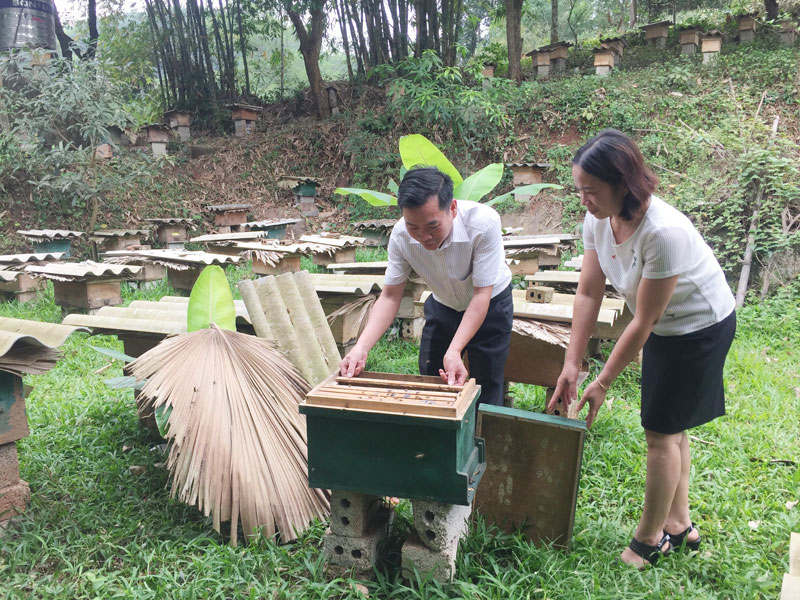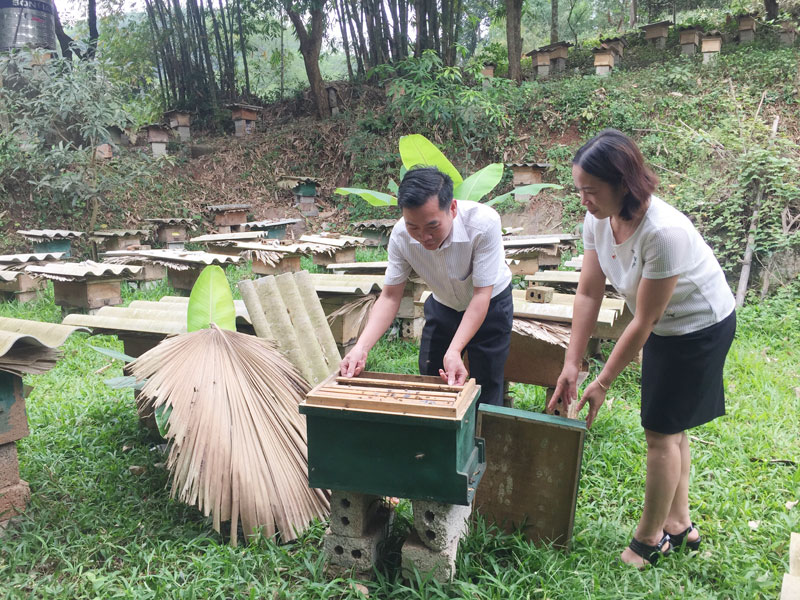
(HBO) - In 2018, the average income of Lac Luong commune was 20.5 million VND a person, the rate of poor and the poverty threshold households accounted for 60.03%.
 Yen Tan Cooperative in Yen Tan hamlet (Lac Luong) has been developing beekeeping for honey with the total revenue of 1.5 billion VND in 2018.
Yen Tan Cooperative in Yen Tan hamlet (Lac Luong) has been developing beekeeping for honey with the total revenue of 1.5 billion VND in 2018.
Mr. Bui Van Bay, the Vice Chairman of Lac Luong People's Committee says "In the past years, the Party Committee and authorities of the commune have been actively propagating and mobilizing the people to change the structure of plants and animals in accordance with the local conditions. We have been utilizing the local potentials and advantages to develop effectively the model of beekeeping for honey, cattle and poultry raising and trade and services.
According to the statistic, currently, there is one cooperative and one cooperative group keeping bees for honey, which has been attracting nearly 50 households taking part in this model. The area of aquaculture has been estimated at 19 ha. The total number of cattle and poultry is over 31,000 ones, in which poultry herds has accounted for 90%. There have been 148 households developing service, trade and handicraft with the total income of over 16 billion VND.”
In order help the households to effectively develop economic models, the commune has been directing the departments, the appropriate authorities and the unions to grasp people's minds and aspirations to organize technical training courses on cultivation, animal husbandry and transferring science and technology, strengthening the prevention and the control of epidemics for cattle and poultry.
Every year, the commune co-ordinates to form from 2 to 3 classes teaching welding and tailoring, attracting a lot of members. Previously, the Poverty Reduction Project (in the period from 2012 to 2018) supported the livelihood groups for beekeeping, pig breeding, goat, zucchini planting, etc. Besides, the commune has been the fiduciary of the Bank for Social Policies and the Bank for Agriculture and Rural Development, helping the households to borrow capital for production development with total debit balance of 75 billion VND.
"In the coming time, the commune’s authorities will continue to propagate and mobilize the people to explore and develop the economic models in accordance with the local conditions. At the same time, we want the departments, the appropriate authorities and the unions to continue paying attention and supporting people to effectively promote the beekeeping model for honey, creating links with other companies and enterprises to expand consumer markets. Thereby the income can be gradually raised and reducing the rate of poor households can be reduced, promoting the local socio-economic development", says Mr. Bui Van Bay, the Vice Chairman of the People's Committee of the commune.
According to data from the Hoa Binh Provincial Party Committee, the industrial production index for the first six months of 2025 is estimated to have increased by 20% compared to the same period last year. This marks the highest year-on-year growth rate for this period since 2020.
In the first six months of 2025, Hoa Binh province’s export turnover was estimated at 1.145 billion USD, marking an 18.11% increase compared to the same period in 2024. Import turnover was estimated at $ 804 million, a 17.15% increase, which helped the province maintain a positive trade balance.
The lives of the ethnic minority farmers in Tan Lac district have gradually improved thanks to the new directions in agricultural production. This is a testament to the collective strength fostered through the professional associations and groups implemented by various levels of the district’s Farmers’ Union.
With the motto the "product quality comes first,” after nearly one year of establishment and operation, Muong village’s Clean Food Agricultural and Commercial Cooperative, located in Cau Hamlet, Hung Son Commune (Kim Boi district), has launched reputable, high-quality agricultural products to the market that are well-received by consumers. The products such as Muong village’s pork sausage, salt-cured chicken, and salt-cured pork hocks have gradually carved out a place in the market and they are on the path to obtaining the OCOP certification.
In the past, the phrase "bumper harvest, rock-bottom prices" was a familiar refrain for Vietnamese farmers engaged in fragmented, small-scale agriculture. But today, a new spirit is emerging across rural areas of Hoa Binh province - one of collaboration, organisation, and collective economic models that provide a stable foundation for production.
Maintaining growing area codes and packing facility codes in accordance with regulations is a mandatory requirement for agricultural products to be eligible for export. Recently, the Department of Agriculture and Environment of Hoa Binh province has intensified technical supervision of designated farming areas and packing facilities to safeguard the "green passport" that enables its products to access international markets.



 Yen Tan Cooperative in Yen Tan hamlet (Lac Luong) has been developing beekeeping for honey with the total revenue of 1.5 billion VND in 2018.
Yen Tan Cooperative in Yen Tan hamlet (Lac Luong) has been developing beekeeping for honey with the total revenue of 1.5 billion VND in 2018.